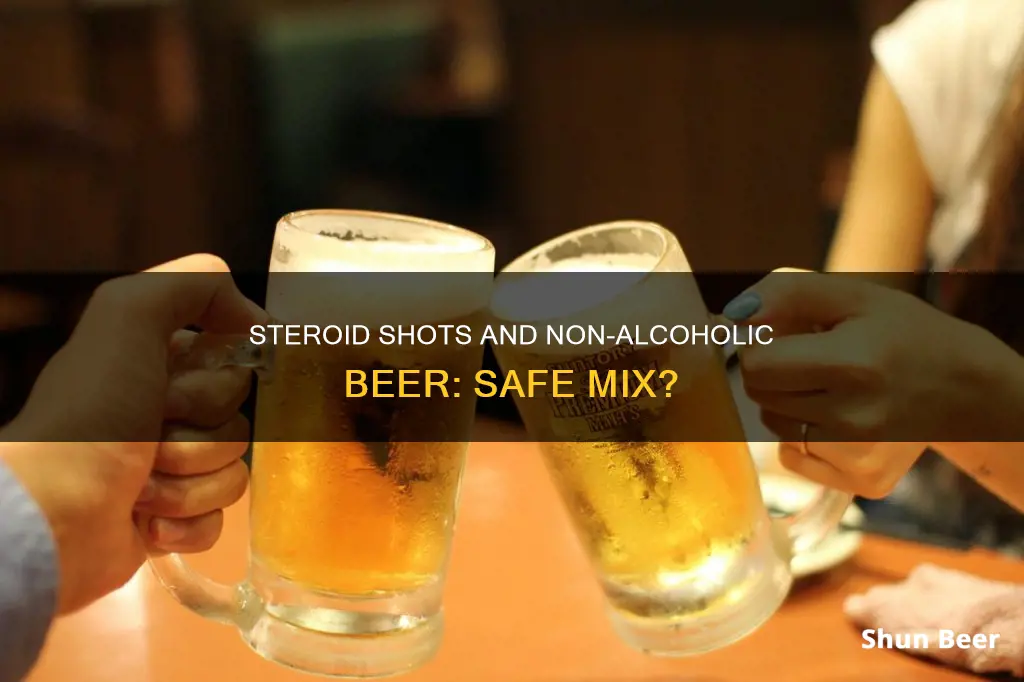
Drinking alcohol while taking steroids is generally not recommended, as it can increase the risk of certain side effects and may worsen the underlying condition being treated. While there may be no direct drug interaction between steroids and alcohol, both substances can suppress the immune system, increase blood sugar levels, and cause damage to the stomach and digestive tract. This can lead to an increased risk of infections, type 2 diabetes, and gastrointestinal issues such as stomach irritation or peptic ulcers. Additionally, long-term steroid use can weaken bones, and when combined with alcohol, may increase the risk of osteoporosis and bone fractures. It is important to consult a doctor or healthcare professional before consuming alcohol while taking steroids, as the risks may depend on various factors, including dosage, length of treatment, and individual medical history.
What You'll Learn
- Non-alcoholic beer contains alcohol and may cause similar side effects
- Prednisone is a steroid that can be prescribed for short or long durations
- Alcohol can worsen the side effects of steroids, including gastrointestinal issues
- Steroids and alcohol both suppress the immune system
- Doctors recommend discussing alcohol consumption with them during steroid treatment

Non-alcoholic beer contains alcohol and may cause similar side effects
Non-alcoholic beer is often marketed as a safe alternative to alcoholic beer. While it contains significantly less alcohol than regular beer, it is not completely alcohol-free. In the United States, beverages containing less than 0.5% alcohol by volume (ABV) can be labelled as "non-alcoholic". This means that even after drinking a non-alcoholic beer, you may still have a slight amount of alcohol in your system.
According to research, nearly 30% of beverages labelled as having no or low alcohol content were found to contain higher levels of alcohol than stated. Some non-alcoholic beers were found to have alcohol levels as high as 1.8% ABV. This discrepancy can be problematic, especially for certain groups of people.
For pregnant individuals, consuming any amount of alcohol is generally discouraged. The American College of Obstetrics and Gynecology (ACOG) recommends avoiding alcohol during pregnancy to eliminate the risk of fetal alcohol spectrum disorder (FASD). As non-alcoholic beers may still contain small amounts of alcohol, they are not considered safe for pregnant women.
People with alcohol use problems or those in recovery from alcoholism should also be cautious about consuming non-alcoholic beer. The smell and taste of non-alcoholic beer can trigger cravings and increase the risk of relapse. Additionally, the small amount of alcohol in non-alcoholic beer can show up on alcohol urine or breath tests, which may be problematic for those in recovery or trying to maintain sobriety.
Furthermore, non-alcoholic beer may have similar side effects to alcoholic beer. It can cause an increase in blood sugar levels, damage to the stomach and digestive tract, dehydration, immune system suppression, impaired wound healing, and bone weakening. These side effects can be especially concerning for individuals taking certain medications or with specific medical conditions.
In conclusion, while non-alcoholic beer contains significantly less alcohol than regular beer, it may still lead to similar side effects. It is important to be aware of the potential risks associated with consuming non-alcoholic beer, especially for pregnant women and individuals with alcohol use problems. As always, consulting with a healthcare professional is the best way to determine if non-alcoholic beer is a safe and appropriate choice for your specific circumstances.
Beer and Zantac: Is It Safe to Mix?
You may want to see also

Prednisone is a steroid that can be prescribed for short or long durations
Prednisone is a synthetic corticosteroid, a type of steroid produced in the body, that can be prescribed for short or long durations. It is used to treat a wide range of conditions, from asthma and allergies to arthritis, inflammatory bowel disease, and adrenal insufficiency. It can also be used to treat certain types of cancer and pneumonia in patients with AIDS.
Prednisone is typically taken orally and can be prescribed as a tablet, delayed-release tablet, solution, or concentrated solution. The dosage and frequency of administration depend on the patient's condition and response to treatment. It is important to note that prednisone should not be stopped abruptly, as it can cause adverse effects, and should be tapered off under medical supervision.
As a corticosteroid, prednisone has anti-inflammatory properties and can suppress the immune system. This makes it useful for treating autoimmune disorders like multiple sclerosis, Crohn's disease, and rheumatoid arthritis. However, this immunosuppressive effect also means that people taking prednisone may be more susceptible to infections.
The use of alcohol while taking prednisone is generally not recommended. Although there is no direct drug interaction between the two, they share similar side effects, including changes in blood sugar levels, damage to the stomach and digestive tract, dehydration, immune system suppression, impaired wound healing, and osteoporosis. Therefore, consuming alcohol while taking prednisone can increase the risk and severity of these side effects. The decision to consume alcohol while on prednisone should be made in consultation with a doctor, considering factors such as dosage, treatment duration, and existing medical conditions.
Does Helium Beer Work? The Science Behind It
You may want to see also

Alcohol can worsen the side effects of steroids, including gastrointestinal issues
While there is no direct drug interaction between steroids and alcohol, mixing the two is not recommended. This is because some of the effects of alcohol and the side effects of steroids are similar, and consuming both at the same time can increase the risk of these side effects occurring.
Both alcohol and steroids can irritate the digestive tract and cause peptic ulcers. Consuming alcohol and steroids together may cause gastrointestinal issues, especially if you are already prone to indigestion or stomach upset.
Alcohol can also worsen other steroid side effects, such as immune system suppression, bone weakening, and weight gain.
Drinking Beer at the Park: Is It Legal?
You may want to see also

Steroids and alcohol both suppress the immune system
While there is no direct drug interaction between steroids and alcohol, it is not a good idea to mix the two. This is because both substances have similar effects on the body, and taking them together can increase the risk of these side effects occurring.
One of the most important shared effects of steroids and alcohol is that they both suppress the immune system. This means that, when taken together, the body finds it harder to fight off infections. This effect is especially pronounced in people who take steroids regularly.
In addition, both substances can cause changes in blood sugar levels, damage to the stomach and digestive tract, dehydration, the development of type 2 diabetes, impaired wound healing, osteoporosis, and pancreatitis.
The risk of side effects increases with the dose and duration of steroid treatment. Whether it is safe to drink alcohol while on steroids depends on the dosage of the medication, the length of the course of treatment, how frequently a person uses alcohol, and other conditions the person may have. In some cases, having the occasional glass or two of alcohol may be safe during treatment with low-dose steroids. However, it is always best to talk to your doctor first to avoid complications and give you the best outcome. Abstaining from drinking alcohol while on steroid treatment is always the best option.
Beer and Pristiq: What You Need to Know
You may want to see also

Doctors recommend discussing alcohol consumption with them during steroid treatment
Steroids, such as prednisone, are prescribed to treat a range of conditions due to their anti-inflammatory and immunosuppressive properties. They can be used to treat asthma, bursitis, multiple sclerosis, Crohn's disease, and rheumatoid arthritis, among other conditions.
However, steroids can have various side effects, including changes in blood sugar levels, damage to the stomach and gastrointestinal tract, dehydration, immune system suppression, impaired wound healing, osteoporosis, and more. Alcohol consumption can enhance these side effects and increase the risk of developing type 2 diabetes, gastrointestinal problems, weakened bones, and a suppressed immune system.
The potential risks depend on several factors, including the dosage and duration of steroid treatment, the amount of alcohol consumed, and any other medical conditions the patient may have. Therefore, it is crucial to discuss alcohol consumption with a doctor during steroid treatment. They can provide personalized advice and guidance based on the patient's medical history and specific circumstances.
In some cases, moderate alcohol consumption may be safe with certain steroid treatments, especially if the dosage is low and the treatment is short-term. However, abstaining from alcohol during steroid treatment is generally the safest option to avoid any potential complications.
Millenials' Work Culture: Beer on the Job?
You may want to see also
Frequently asked questions
It is not recommended to drink non-alcoholic beer with a steroid shot as alcohol can worsen some of the side effects of steroids, such as gastrointestinal issues, weakened bones, and blood sugar changes.
The side effects of drinking non-alcoholic beer with a steroid shot can include gastrointestinal issues, weakened bones, and changes in blood sugar levels.
It is recommended to consult a doctor to determine when it is safe to drink non-alcoholic beer after receiving a steroid shot, as it depends on various factors such as the condition being treated and the presence of other risk factors.
Drinking non-alcoholic beer with a steroid shot can increase the risk of infections, as both steroids and alcohol suppress the immune system. It can also worsen the underlying condition being treated.
There is currently no evidence to suggest that there are any benefits to drinking non-alcoholic beer with a steroid shot. It is important to note that mixing substances can be dangerous and even deadly.







